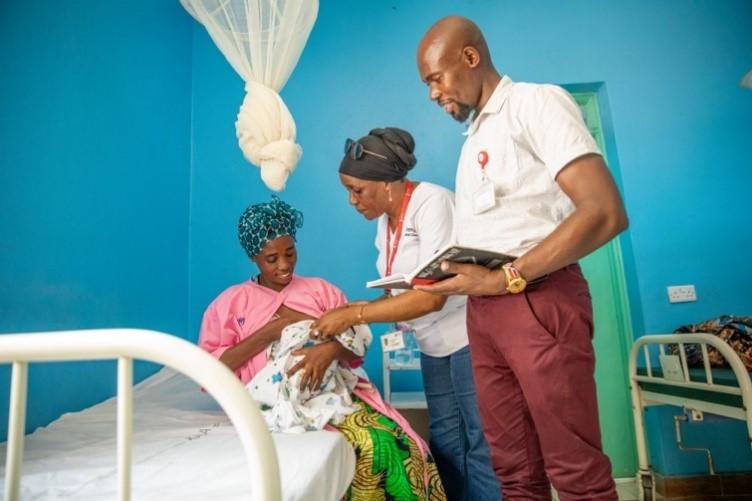
The soft coos and gentle cries of newborn babies emanate from the maternity wing of Natukobenyo Health Centre, located in the Kalobeyei Settlement in northern Kenya. Buchumi, a Burundi refugee and new mother sits up on her bed, gently holding her baby girl Light, who was born just a day ago.
“When I arrived here last night, I was received so well. I found a doctor who helped me deliver my baby,” she smiles.
The maternity wing has provided a lifeline for pregnant mothers like Buchumi. With support from the EU Trust Fund, the maternity wing which is managed by the UN Refugee Agency’s health partner, the Kenya Red Cross Society (KRCS), is helping hundreds of pregnant refugee mothers like Buchumi and Kenyan mothers alike, to deliver their babies safely. Expectant mothers receive support during prenatal visits and have access to the ambulance service hotline, provided by KCRS.
“When I started having pains last night, I called the ambulance right away. They picked me and brought me here,” adds Buchumi. “I had no strength left, but the doctor at the clinic helped me.”
Asha Amber, a nurse in charge from KRCS says the centre has been pivotal to maternal services provided in the Kalobeyei Settlement.
“Maternal health care is crucial, especially here where most expectant mothers don’t have steady sources of income and have to worry about providing for their families,” she explains. “We are happy to have this facility where they can receive special attention and deliver their babies safely.”
Dr. Jesse Muriithi, UNHCR’s Public Health Officer in Kakuma, expressed his gratitude for the support from the European Union.
“This collaboration has been instrumental in providing both safe delivery services for the host and refugee communities living in Kalobeyei. Without it, we would have high rates of avoidable maternity and neonatal mortality.”
Between January and April 2024, over 4000 babies were delivered in health facilities across Kakuma camp and Kalobeyei Settlement, with close to 600 of them delivered in Natukobenyo Health Centre alone. With support from the European Union, UNHCR was able to build and equip the maternity ward in 2018 which was recently renovated in 2023.
“I am so grateful for this centre. If there were no maternity wing, we would not be able to deliver our children safely. May God continue providing for them so we can have more facilities for mothers to continue having safe deliveries,” says Buchumi as baby Light coos in her arms.
About the EUTF project:
The EU Trust Fund Project "Enhancing Self-reliance for refugees and host communities in Kenya" started in 2020. Building on the pledges made by the Government at the Leaders’ Summit in 2016, the formal application of the CRRF in Kenya was announced following the 68th Session of UNHCR’s Executive Committee in October 2017. The project was implemented mainly in Turkana and Garissa counties and built upon the gains made through the implementation of the Regional Development and Protection Programme in Kenya: Support to the Kalobeyei Development Programme: EUTF05 – HoA – KE – 17 implemented from 21 July 2016 and 30 October 2019 whose main objective was the creation of an evidence-based, innovative and sustainable development and protection solution for refugees and host communities in Kalobeyei through the establishment of an integrated settlement area, in which refugees and the host community live together peacefully, have access to social services and develop economic ties to build sustainable livelihoods.
Details
- Publication date
- 12 June 2024
- Author
- Directorate-General for International Partnerships
- Region and Country
- Horn of Africa
- Kenya
- Thematic
- Improved migration management
- Strengthening resilience of communities
- Partner
- United Nations High Commissioner for Refugees


